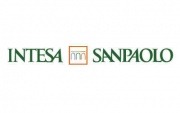Difference between revisions of "Intesa Sanpaolo S.p.A."
(Created page with "{| class="infobox vcard" style="border:1px solid grey; background-color:#FAFAFA; float:right; margin-left: 10px; width: 20em" ! colspan="2" class="n" style="text-align: center...") |
(No difference)
|
Revision as of 13:54, 4 December 2014
| Intesa Sanpaolo S.p.A. | |
|---|---|
| Industry | Financial Services |
| Founded | 2007 (as a merger of Banca Intesa and Sanpaola IMI) |
| Headquarters | Berlin, Germany |
| Area Served | Italy, Central-Eastern Europe, North Africa and the Middle East |
| CEO and Managing Director | Carlo Messina: |
| Chairman of the Management Board | Gian Maria Gros-Pietro |
| Chairman of the Supervisory Board | Giovanni Bazoli |
| General Manager | Gaetano Miccichè |
| Products | Retail, Investment and Private Banking, Investment Management, Public Finance |
| Financial Services | Volkswagen Financial Services AG |
| Market Value | 55.228.000.000 m$ |
| Employees | 96,170 |
| Website | www.intesasanpaolo.com |
Contents
About Intesa Sanpaolo
Intesa Sanpaolo is an Italian banking group based in Turin, Italy. It was officially formed in 2007 after the merger between Banca Intesa and Sanpaolo IMI. Intesa Sanpaolo is one of Italy’s leading banks, becoming Italy’s second largest bank in 2009 after the merger, but worldwide it only has a minor growing presence. Prior to the merger of the two banks to form Intesa Saopaolo, Banca Intesa and Sanpaolo IMI were both products of large bank mergers from 1998. For efficiency, Intesa Sanpaolo’s business operations are split up into five groups: Banca de Territorie, Corporate and Investment Banking, International Subsidiary Banks, Eurizon Capital, and Banca Fideuram. Banca de Territorie, the largest group, handles day-to-day banking operations domestically in Italy. The Corporate and Investment Banking division runs the development of the bank’s international institutions and Eurizon Capital runs the Asset Management sector of the bank. The Banca Fideuram division offers financial advice services. It was created in 1968 as a subsidiary of IMI with the purpose of managing IMI's Luxembourg mutual fund business. In 1992 it was merged with another subsidiary Manusardi and that is when it officially became Banca Fideuram. In 1997, it entered the private banking industry, 2000 it became a broker after acquiring French Company Groupe Wargny.
Engagement in Cultural Diplomacy
Intesa Sanpaolo works with many cultural initiatives in the art, sport and history fields. On its website, the bank writes “Initiatives centred on supporting, promoting, and making the most of culture and knowledge play a key role in our relations with the collective frameworks within which we operate and in the dialogue we establish with them. In this regard, our commitment ranges from projects for safeguarding the Italian historical and artistic heritage to public use of the Group’s assets and collections, including solidarity-oriented initiatives and promotion of sports events.” Intesa hosts a number of cultural events such as Picasso and Spanish Modernity, a modern art exhibition and was an official sponsor of the 2014 XVII Women’s World Volleyball Championship in Italy.
Employment Policy
Intesa Sanpaolo employs over 96,000 workers, the overwhelming majority working in Italy. In practice, Intesa has adopted a dual corporate governance system in which control and strategic management functions are separated from the management of the company's business. The supervisory board is appointed by the shareholders' meeting. It supervises the activities carried out by the management board and, in particular, it approves the main strategic initiatives proposed by the management board. The management board appoints one of their members for the executive positions in the bank. The bank usually hires workers with a background in finance.
Sustainability
In 2014, Intesa Sanpaolo entered the Global Index of Companies Combating Climate Change.The index is comprised of 187 companies chosen for their advanced approach towards the fight against Climate Change. The index was compiled by CDP, the international NGO geared towards sustainable economies, upon the request of 767 investors representing more than one third of the capital invested at global level.
